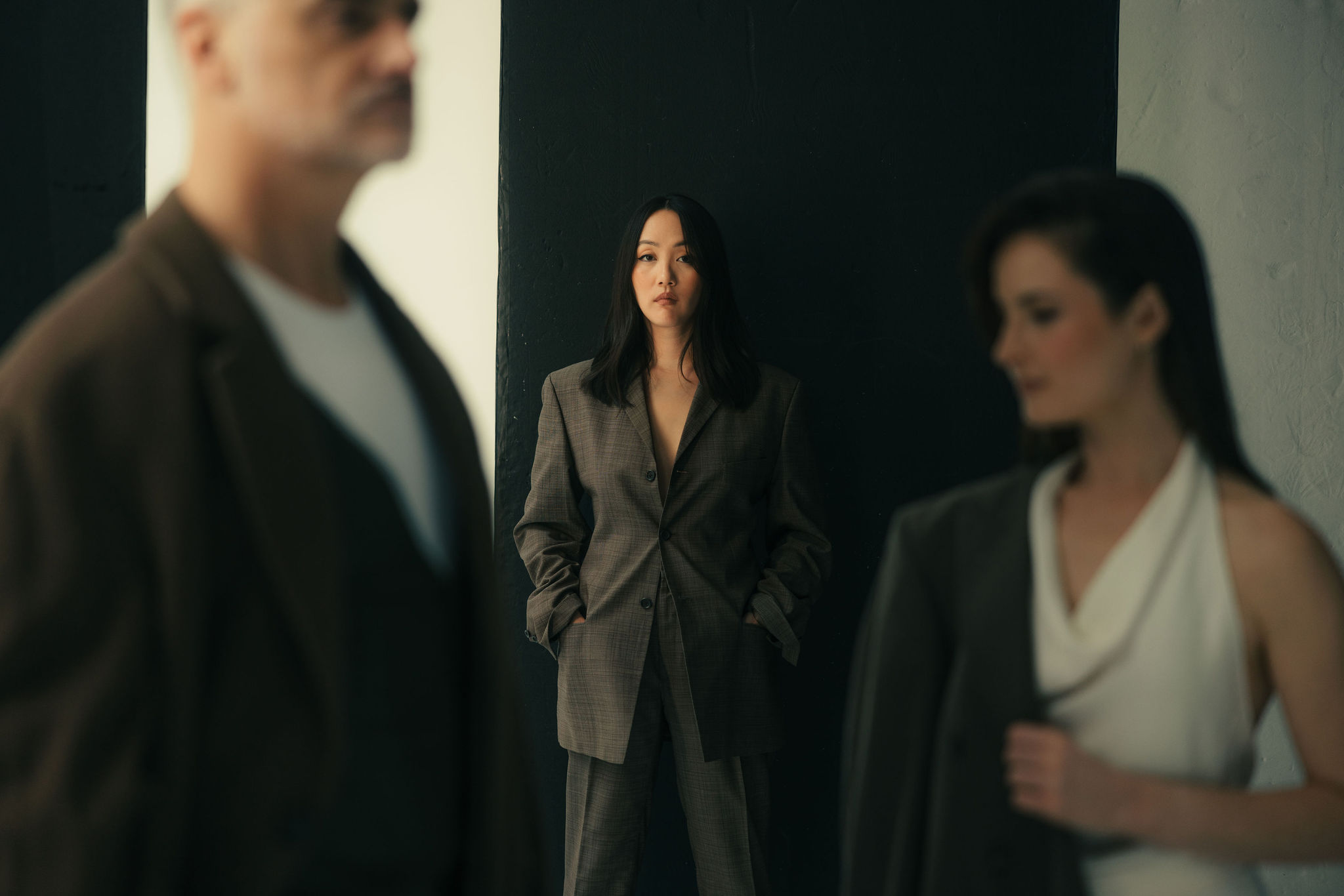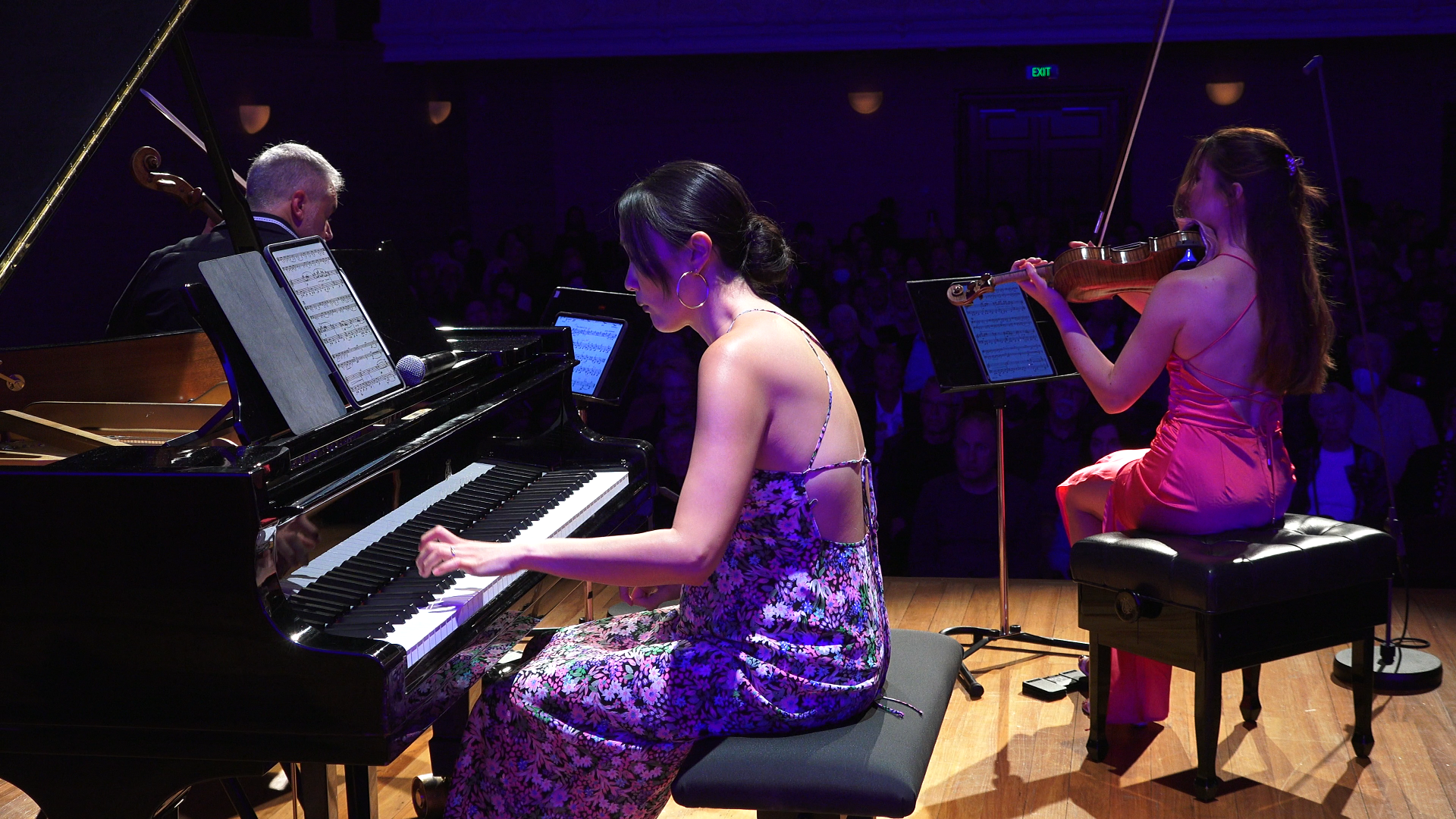Breaking the silence imposed by the COVID-19 restrictions, NZTrio took themselves and their audience to full stretch in terms of both diversity, sound and technical challenge. And they delivered an ambitious and triumphant night in full celebration of being 100 percent back in business.
Read more here.
~ Clare Martin, Radio 13
Breaking the silence imposed by the COVID-19 restrictions, NZTrio returned to the stage last night in the Concert Chamber of Auckland’s Town Hall. Their programme titled Origins touched on the performers’ own ancestral backgrounds as well as paying homage to Beethoven’s 250th anniversary.
Alas, we were not in the cosiness of Q Theatre’s Loft, and it is a puzzle that the theatre has not opened its doors when artists such as NZTrio are battering it down with a programme at the ready. However, the Concert Chamber offered a bigger acoustic and maybe a richer experience. And not to be sniffed at after such a lean year, more actual seats to generate ticket income. And how appropriate for NZTrio to have the bigger venue as a fanfare for their first performance of the year.
To come out of COVID silence then and open with Beethoven’s Piano Trio No. 5 in D Major, the “Ghost” had a whiff of audacity. It opens with such adrenaline that players must need to be already pumped to bring it off with full aplomb. Not to mention it is outrageously well-known that one nervous stroke could be noticed. And perhaps the slightly tricky octave string tuning of the second movement betrayed a little of the awe of the situation. However, the professionalism of NZTrio kept things beautifully moving and it was a real pleasure to hear this live.
Backlit by pink, NZTrio eased into the rich acoustic of the Concert Chamber by the third movement. The drive of this last movement caught vigour and excitement. Here we felt the players bouncing energy off one another and having a real musical conversation. The Town Hall Steinway piano was given full glorious voice under the flying fingers of Somi Kim.
Having paid due homage to the master, the British lineage of cellist Ashley Brown was next. Contemporary composer Mark-Anthony Turnage’s A Fast Stomp was a complete change of soundscape. Brown described that Turnage would really like this work talked of in punk terms, or perhaps ska or grunge. But, as my companion observed, this could have been Shostakovich’s lost trio, it had the revolutionary sounds of the 1930s. With it’s driving voltage and rhythmic syncopation the Turnage was a hugely energising piece. Kim gave great depth to the piano stomping. The strings of Amalia Hall and Brown had brilliant Bartok-like pizzazz. It had the kind of raw acidity that was a good foil to the rich Germanic temperament.
New Zealand composer Sarah Ballard’s Prema Lahari was a new commission and offered up a sanctuary next. Opening like liquid sun it poured peace upon the audience. The title is a Sanskrit term meaning ‘waves on the ocean of pure love’ and arose from Ballard’s own meditative practice. A recording of the Indian tampura created a meditative cycle against the strings, albeit a bit too loud against the acoustic Trio at the start. It was appropriate that Amalia Hall with her one-eighth Indian ancestry took up the first ‘voice’ of the piece. Richly developed through cello with sitar-like ripples on the piano, this was a beautiful piece that I would love to hear lengthened a little. Ballard’s own chanting infused the finish with beauty and the handbells created a spine-tingling ending.
After an interval in the classy foyer of the Town Hall, it was on with the concert and a visit to Somi Kim’s Korean ancestry. Not a sound world I am familiar with, it was with truly fresh ears that I heard Korean composer Isang Yun’s Piano Trio. Written between 1972 and 1975 immediately we were somewhere new. It was a more spacious soundscape with quiet intensity punctuated by bursts of tone clusters, a more challenging piece for the audience and I imagine for performers too. Kim reached into the body of the piano and plucked strings. A soft rainstorm, the groan of ancient trees and the waking of insects could almost be heard. A very refreshing soundscape and maybe a first for New Zealand?
Finishing this Origins programme we were swept into 1890s Vienna with Alexander Zemlinsky’s Piano Trio in D minor. It was Romantic pinot noir to the Korean ginseng tea. Here the Trio seemed to stretch out, Kim on piano luxuriated in the runs from top to bottom of the keys. Here was Hall’s honeyed tone that has wooed us in previous concerts. And Brown’s consummate beauty of tone and pliable give-and-take created a rich string interplay. It is a perfect choice to bookend with “The Ghost”, and such a peach of a piece which allowed all players to shine.
Last night was a night of firsts – the official launch of the new permanent line-up of performers for the NZTrio, their first concert of the year and (surprisingly) the first show in the Auckland Town Hall since lockdown. The Trio took themselves and their audience to full stretch in terms of both diversity, sound and technical challenge. And they delivered an ambitious and triumphant night in full celebration of being 100 percent back in business.
Radio 13 – Clare Martin

